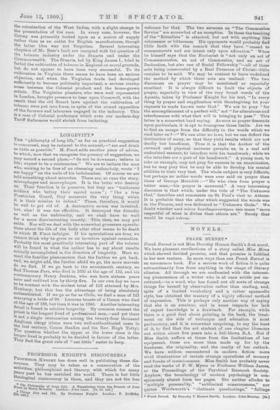PROFESSOR KNIGHT'S DISCOURSES.t
PaorEsson KNIGHT has done well in publishing these dis- e°°rIles. They may be taken as a consecration of the activities, philosophical and literary, with which for many Years past he has enriched the world. There is but little theological controversy in them, and they are not the less
.2 The Philosophy of Long Life. A Translation from the French of Jean Kinot by Harry Ho lyerts. London : John Lane. [To. nd, not.]
t rhinos New and Old. By Professor Knight. Loudon F. Griffiths. De. ust.3 welcome for that. The two sermons on "The Communion Service" are somewhat of an exception. In these the teaching' of the "Ritualists" is attacked, but not with anything like vehemence or bitterness, His opponents would probably find little fault with the remark that they have "ceased to commemorate and are intent only upon adoration." When he himself says that the Eucharist is "not only an act of Commemoration, an act of Communion, and an act of Dedication, but also one of Social Fellowahip"—all of these acts being consecrated by a Real Presence of Christ—little remains to be said. We may be content to leave undefined tho method by which these acts are realised. The two discourses on prayer may be mentioned as especially excellent. It is always difficult to limit the objects of prayer, especially in view of the very broad words of the Apostle, taken by Professor Knight for his text, "In every thing by prayer and supplication with thanksgiving let your requests be made known unto God." We are to pray "for the accomplishment of a perfect will," not "for alterations and interferences with what that will is bringing to pass." This latter is a somewhat hard saying. As soon as prayer descends upon particulars, it is apt to transgress these limits. Are we to find an escape from the difficulty in the words which we read later on P—" We can alter no laws, but we can deflect the destination of many, so that they yield results which are nob deadly but beneficent. Thus it is that the Author of the outward and physical universe permits us, in a real and undoubted manner, to interfere with his handiwork ; while we who interfere are it part of his handiwork." A. young man, to take an example, may not pray for success in an examination, but he may pray that he may be able to develop his mental abilities to their very best. The whole subject is very difficult, but perhaps no nobler words were ever said on prayer than those of George Meredith :—" He who rites front prayer a better man,—his prayer is answered." A very interesting discourse is that which, under the title of "The Unknown God," describes and comments on St. Paul's visit to Athens.' It is probable that the altar which suggested the words was in the Piraeus, and was dedicated to "Unknown Gods." We doubt whether Kartl ravra aficrt8apovecrripovs can mean "more respectful of what is divine than others are." Surely that would be trap& ircivrar.










































 Previous page
Previous page